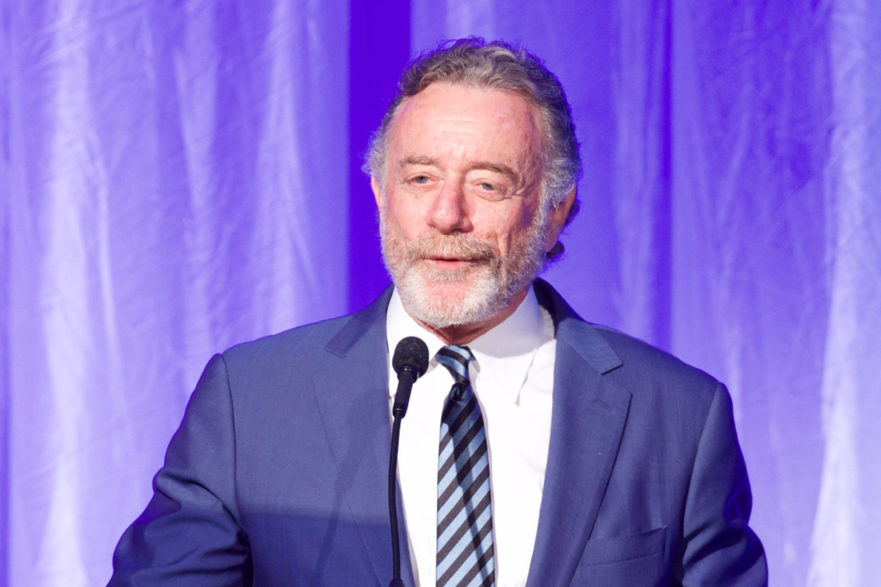Jarl Mohn, CEO of National Public Radio (NPR), at the International Medical Corps Annual Awards Celebration in November, 2016. Photo by Earl Gibson III/Getty Images for Third Street Media Group.
The floodgates that opened with allegations against Harvey Weinstein have revealed abusers in every industry, from politics to finance to athletics, and journalism is no exception.
We know that these problems are not simply about one bad man, but rather, about an entire community of people that ignores or enables inappropriate behavior. News outlets need to reckon with how to re-earn the trust of both employees and audience, particularly if they wish to weigh in on these issues themselves. We know that in any instance of workplace harassment, many people become complicit by allowing the behavior to continue.
After the head of its news division, Michael Oreskes, was accused of sexual harassment including unwanted kissing, NPR’s David Folkenflik was able to show the extent of the company’s mistakes. Folkenflik reported on a 2015 incident at NPR to add on to mounting allegations against Oreskes from his time at the New York Times. NPR’s Yuki Noguchi reported that Oreskes did not complete mandatory sexual harassment training. Oreskes resigned last week, saying, “I am deeply sorry to the people I hurt.” (Disclosure: I worked as an intern at NPR.)
NPR journalists’ interest in transparency on this issue exposed another company shortcoming when CEO Jarl Mohn failed to disclose knowledge of an incident at NPR in an NPR radio interview. Mohn told NPR’s Mary Louise Kelly: “And I will tell you up to this moment sitting here and talking with you, Mary Louise, I’m not aware of anything that he’s done or that happened that bears any resemblance to those issues that occurred 20 years ago while he was at the New York Times.” Mohn has since taken a medical leave of absence.
Folkenflik, Noguchi, and Kelly’s reporting reflects a level of respect for the audience that is at the core of public radio’s ethos, and that is too easily forgotten: It implies that listeners and supporters are owed an explanation. Their work has allowed the newsroom to publicly grapple with their own shortcomings—but other news organizations have taken the opposite approach, all but omitting their own sexual harassment scandals from their coverage.
Take Vox, for example, which fired its editorial director, Lockhart Steele, for sexual harassment.
Eater (a part of Vox Media), which Steele co-founded, published a piece about his departure: “That behavior is not part of our company culture, goes against our very mission, and will never be tolerated at Eater now or in the future,” Amanda Kludt wrote. But while Vox itself published an essay on sexual harassment that happened at the New Republic, and another piece called “Want to stop sexual harassment? Start helping women,” the revelation of Steele’s behavior was only mentioned in a brief by Matt Yglesias.
It’s also worth noting that Yglesias referred to sexual harassment firings as “claiming a number of prominent scalps,” alluding to a practice by European colonizers that was a part of widespread murder of North American indigenous peoples—a sloppy comparison at best, and one that compares victims to aggressors.
Vox isn’t the only place that has taken a departure from NPR’s transparency. Mother Jones’ David Corn is under internal investigation for inappropriate behavior including rape jokes and unwanted touching, but the magazine hasn’t published a word about it. Corn apologized in a statement to Politico.
Rolling Stone’s Matt Taibbi has come under fire for misogynistic writing, and he continues to publish essays for the magazine. Taibbi wrote in response: “I continue to deny absolutely that I have ever sexually harassed anyone in any office.”
When the now-notorious “Shitty Media Men” spreadsheet circulated, Buzzfeed was quick to criticize it despite the fact that the list named members of their own newsroom. The Guardian referred to Sam Kriss, accused of sexual assault, as a “VICE journalist,” but he was a freelancer who wrote for The Guardian, too. Kriss responded to the accusations in a post that has since been deleted, saying, “My behaviour was absolutely unacceptable.”
We haven’t seen anything at the New Republic about Leon Wieseltier’s misconduct except one brief mention of him in a piece about the television show House of Cards—but we have read about it plenty at other publications.
At Splinter, Clio Chang, a former TNR writer, wrote a piece about the way Wieseltier’s conduct was enabled by the culture at the magazine. “It’s clear that the problem inside TNR ran deeper than the transgressions of one man, as is almost always the case in a workplace that engenders continued sexual harassment,” Chang wrote. It would be great to hear more reflections like Chang’s. (Disclosure: I very briefly worked as an intern at the New Republic.)
After NBC’s Mark Halperin was accused of harassment, Morning Joe’s Mika Brzezinski made a statement: “We want to know more about these disturbing allegations. We want to hear the stories. We need to know what happened. And we’re not going to avoid the story just because he’s our friend.”
We reached out to TYT leadership with questions regarding workplace sexual harassment. TYT Sr. VP of Operations David Koller replied: “TYT investigates all allegations about specific employees and incidents, and these investigations are treated as a confidential Human Resources matter to protect all involved.”
Of course there is no journalistic requirement for news organizations to publicly address the ways that they have enabled systemic misogyny the way that NPR has. But if these outlets wish to earn readers’ trust back, particularly in their coverage of sexual violence, they would be smart to. They owe their readers, and their employees, an explanation.
This story was updated at 7:15 p.m. EST after comment from TYT was recieved.


